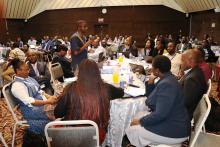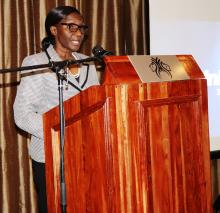Annual peer review and planning workshop for Anglophone national malaria programmes in Africa takes place in Harare
A workshop on annual peer review of progress and planning for Anglophone countries is taking place in Harare from 22nd to 23rd March at The Monomotapa Hotel. The meeting has brought together participants from Botswana, Eritrea, Ethiopia, The Gambia, Ghana, Kenya, Liberia, Malawi, Mozambique, Namibia, Nigeria, Sierra Leone, South Africa, South Sudan, Swaziland, Uganda, URT Mainland, URT Zanzibar, Zambia, and Zimbabwe, partners in malaria control and facilitators from HQ, AFRO and IST/ESA. The country participants are composed of a WHO staff and a national malaria programme manager from Ministries of Health and two staff from the programme.
The WHO Inter-country Support Team for Eastern and Southern Africa (IST/ESA) has convened annual meetings for national malaria programmes in the region to build their capacity for interrogation of their surveillance data and its use for decision-making. In 2015, countries requested that there was need to bring back the annual review and planning meetings in order to strengthen implementation of recommendations relevant to malaria surveillance, monitoring and evaluation. For this reason WHO organized this annual review and planning meeting back to back with the malaria surveillance workshop which took place from 18th to the 21st March 2018.
The general objective of the workshop is to provide a platform for peer review of progress made in 2017 by national malaria programmes and plan for 2018/2019. The specific objectives are as follows:
- To provide technical updates on epidemic preparedness and response for malaria programmes.
- To peer review country progress in 2017 and plans for the 2018/19 malaria season
- To agree on the next steps for each country for 2018/19.
The meeting avails an opportunity for countries to share experiences in implementation of malaria programmes peer learning on how to deal with malaria epidemics. The meeting will further identify technical support needs and next steps for each country for 2018/2019.
In her speech to officially open the meeting, WR Zimbabwe a.i. Dr Juliet Nabyonga said malaria remains a major public health problem in Africa, and of the fifteen countries that make up the bulk of the global burden of disease (contributed to 80% of the worldwide malaria burden), all but one (India) are found in sub-Saharan Africa. “Of these countries, Ghana, Malawi, Mozambique, Nigeria, Uganda, and United Republic of Tanzania are represented in this room,” she said. She also said funding for malaria remains low and among the 41 high-burden countries, funding per person at risk of malaria remains below US$ 2, and that investments in malaria control have, on average, declined in many high-burden countries, resulting in most countries in Africa relying on external funding to fight malaria. She urged participants to develop a culture of analysing the data they collect and make use of it in making strategic and operational decisions.
Key partners in malaria control were also part of this meeting. These include the RBM Partnership to end malaria, UNICEF, USAID/PMI, SADC and E8 and the Global Fund.
There are over 800 million people in the African region at risk of malaria, with 82% at high risk of the disease. Approximately 190 million cases (89% of the global total) and 400,000 deaths (91% of the global total) were estimated to have occurred in 2015. Globally 15 countries account for 80% of cases, 13 of which are in the WHO Africa Region. The vast majority of deaths occur in children under five years old. About 41 million out of 163 million children under five (25%) in sub Saharan Africa still live their lives unprotected from malaria. Challenges such as weak health systems, gaps in the uptake of available interventions, low per capita investment on malaria, the threat of resistance to current treatments and the increasing resistance of mosquito vector species to insecticides continue to hamper malaria control and elimination efforts.


